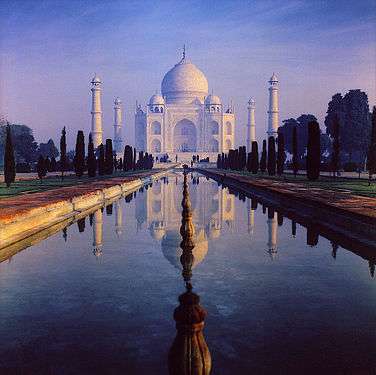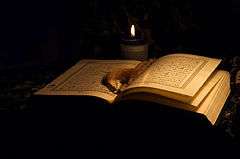Laylat al-Qadr
| Laylat al-Qadr | |
|---|---|
|
Reading Qur'an is one of the key observances of the Qadr night. | |
| Official name | ليلة القدر (Night of Decree) |
| Also called | Night of Power, Night of Value, Night of Destiny, or Night of Measure |
| Observed by | Muslims |
| Significance |
Night the Quran was revealed; Angels descend to the earth and the annual decree is revealed to them; Better than 1000 months of worship |
| Observances | Night prayers, Reading Quran, Making Dua, Doing Dhikr, Observing Iʿtikāf |
| Date | See text |
 |
| Part of a series on |
| Islamic culture |
|---|
| Architecture |
| Art |
| Dress |
| Holidays |
| Literature |
| Music |
| Theatre |
|
Laylat al-Qadr (Arabic: لیلة القدر) (also known as Shab-e-Qadr , loaned from Persian), variously rendered in English as the Night of Decree, Night of Power, Night of Value, Night of Destiny, or Night of Measures, is in Islamic belief the night when the first verses of the Quran were revealed to the Islamic prophet Muhammad. It is one of the odd nights of the last ten days of Ramadan and is better than 1000 months of worship. Muslims believe that on this night the blessings and mercy of Allah are abundant, sins are forgiven, supplications are accepted, and that the annual decree is revealed to the angels who also descend to earth.
Revelation to Muhammad
Muslims believe that Laylat al-Qadr was the night when the Quran[1] was revealed to Muhammad from Allah. Most Muslims believe that revelation of the Quran occurred in two phases, with the first phase being the revelation in its entirety on Laylat al-Qadr to the angel Gabriel (Jibril in Arabic) in the lowest heaven, and then the subsequent verse-by-verse revelation to Muhammad by Gabriel, across 23 years. The revelation started in 610 CE at the Hira cave on Mount Nur in Mecca. The first Sura that was revealed was Sūrat al-ʿAlaq (in Arabic العلق). During the first revelation the first five verses of this Sura, or chapter, were revealed.
Sunnah
Muslims often offer extra prayers, particularly the night prayer. They hold a vigil, pray, seek Allah's forgiveness and mercy, and hope that their supplications will be accepted on this night. Mostly, they perform tilawat (reading the Quran).
Those who can afford to devote their time in remembrance of Allah stay in the mosque for the final ten days of Ramadan. This worship is called Iʿtikāf (retreat). They fast during the day and occupy themselves with the remembrance of Allah, performing voluntary prayers and studying the Quran, day and night, apart from the obligatory prayers which they perform with the congregation. Food and other necessities of life are provided for them during their stay in the mosque. By devoting time to remember Allah, Muslims also hope to receive divine favors and blessings connected to Laylat al-Qadr.
Date
Sunni Islam
Laylat al-Qadr is to be found in the last five odd nights occurring during the final 10 days of Ramadan. There is no mention in the Quran as to when the specific date is.[2][3] Therefore in Islamic countries and Sunni communities all over the world, Laylat al-Qadr is found to be on the last nights of Ramadan, mostly in on one of the odd nights (21st, 23rd, 25th, 27th or 29th) whereby night precedes day. Many traditions insist particularly on the night before the 27th of Ramadan.[4]
Shia Islam
Similarly Lailatul Qadr' is to be found in the last ten odd nights of Ramadan but mostly on the 19th, 21st or 23rd of Ramadan. The 19th, according to the Shia belief coincides with the night Ali was attacked in the Mihrab while worshipping in the Great Mosque of Kufa, and died on the 21st of Ramadan. Shia Muslims worship and regard these three nights as greatly rewarding.
Many Shia Muslims, who make up the largest minority of Islamic followers — including the Ismailis and Dawoodi Bohras — observe Laylat al-Qadr on the 23rd night of Ramadan, in keeping with traditions received through Ali and his wife Fatimah, Muhammad's daughter and the Fatimid Imams.[5] The tradition is also said to have been articulated by Ja'far al-Sadiq and other Shia Imams.
Mahdavi Muslims
Mahdavi Muslims observe Laylat al-Qadar on 27th night of Ramadan with all religious fervor, pomp and gaiety as "Dougana Laylat al-Qadr" (In Persian, the word Dougana means "double". Here the word Dougana symbolizes the two Rake's of prayers performed during this night). Following the practice and traditions of their Promised Mahdi Syed Muhammad Jaunpuri, thousands of Mahdavi men, women and children dress in colorful traditional attire and converge at Mahdavia mosques in their respective localities. Past midnight, between 26th and 27th Ramadan they offer two Raka'as special and collective thanksgiving prayers led by their Murshids.
Mahdavis believe that Allah blessed them with this most Valued Night of Might/Power, by the virtue of Syed Muhammad Jaunpuri while travelling from Thatta (now in Pakistani province of Sindh) towards Farah (now in Afghanistan). During his stay in Makran, Imam Mahdi, in compliance with divine order, offered Dougana Laylat al Qadar past midnight of 27th Ramadan in 908 Hijri along with his companions at the nearby mountain which was later named after him as Koh-e-Murad,[6][7]
Though Mahdavis spread all over the world, widely populated in Telangana, Andhra Pradesh, Tamilnadu, Karnataka, Maharashtra, Gujarat and Rajasthan (now in India), as well as in Sindh and Baluchistan (now in Pakistan), and in Herat and Farah in Afghanistan.
Mahdavis, a small minority, are one among 72 sects of Islam. They do not have any religious books of their own and follow only the Quran, the traditions and the practices of the Prophet Muhammad (Sunnah), as Syed Muhammad Jaunpuri clearly declared that "I have not brought any new religion. I follow the Quran and footsteps of Prophet Muhammed".
Religious importance
Quran
We have indeed revealed this (Message) in the Night of Power:
And what will explain to thee what the night of power is?
The Night of Power is better than a thousand months.
Therein come down the angels and the Spirit by Allah's permission, on every errand:
Peace!...This until the rise of dawn!
The verses above regard the night as better than one thousand months. The whole month of Ramadan is a period of spiritual training wherein believers devote much of their time to fasting, praying, reciting the Quran, remembering Allah, and giving charity. However because of the revealed importance of this night, Muslims strive [give more effort] harder in the last ten days of Ramadan since the Laylat al-Qadr could be one of the odd-numbered days in these last ten (the first, third, fifth, seventh or ninth). Normally, some Muslims from each community perform iʿtikāf in the mosque: they remain in the mosque for the last ten days of the month for prayers and recitation. Women also observe i'tikaf. They remain in prayer and meditation mostly, although they are allowed to do the minimum domestic work to run the family. When Muhammed observed i'tikaf in a tent, he saw a few tents around his. His wives joined him by pitching tents.
See also
References
- ↑ Dr. Muhammad Nayef Lau Sulayman mentioned in the holy book of the Almighty, Allah said about Sohuf: Indeed, this Qur'an guides to that which is most suitable and gives good tidings to the believers who do righteous deeds that they will have a great reward. Qur'an V17:09
- ↑ Islam and state in Sumatra: a study of seventeenth-century Aceh. p.128.
- ↑ Marjo Buitelaar. Fasting and feasting in Morocco: women's participation in ramzan. p.64
- ↑ Night of 27 Ramadan
- ↑ "The Ismaili: Laylat al-Qadr". Retrieved 2015-07-08.
- ↑ Koh e Murad
- ↑ Dogana laytul qadr reference.
- ↑ Quran 97:1–5
External links
| Wikimedia Commons has media related to Laylat al-Qadr. |
- Laylatul Qadr, the Night of Power on Beliefnet.com
- Laylat Al-Qadr, The Night of Power - Last 10 Days
- Lailatul Qadr
- Laylat al Qadr
- Shab e Qadr 2011 (Laylat al-Qadr)
- Al Qadr (The Night of Power And Fate)
- Al Qadr Learn Surah Al Qadr with Audio at MountHira.com
- Lailat al Qadr (BBC Religion) with dates
- The Powerful Night of ramzan
- Laylatul Qadr: Introduction and guidance on special prayers for the night. (Includes Salaatul Tasbeeh)
- "Deliverance from Error on Knowledge of Times of Day and the Direction of Prayer" is an Arabic manuscript from 1683 which talks about the Night of Destiny
| ||||||||||||||
| ||||||||||||||||||
